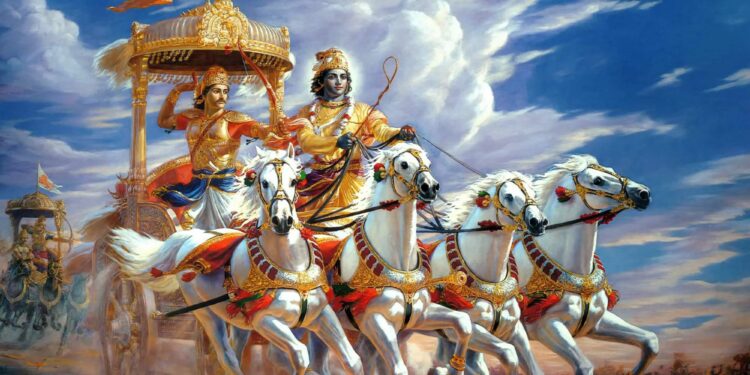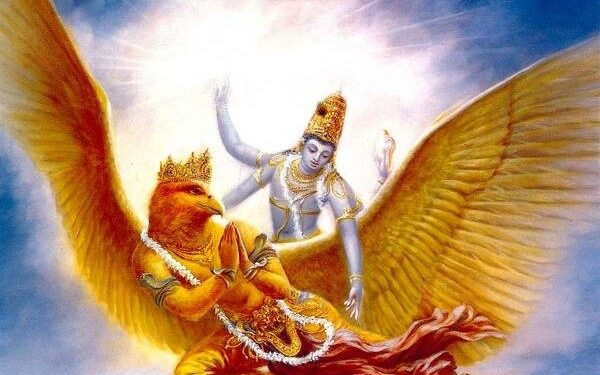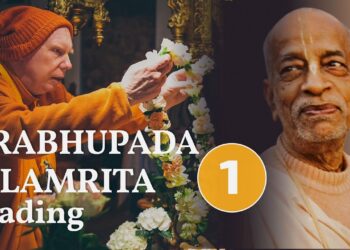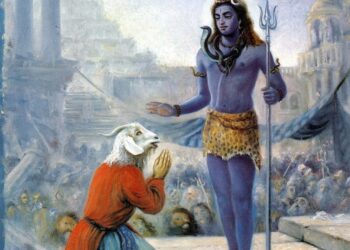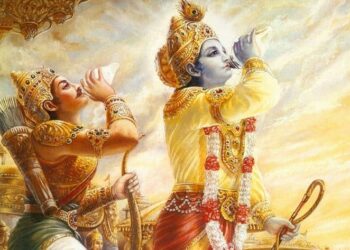TEXT 5
uddhared ātmanātmānaṁ
nātmānam avasādayet
ātmaiva hy ātmano bandhur
ātmaiva ripur ātmanaḥ
SYNONYMS
uddharet—one must deliver; ātmanā—by the mind; ātmānam—the conditioned soul; na—never; ātmānam—the conditioned soul; avasādayet—put into degradation; ātmā—mind; eva—certainly; hi—indeed; ātmanaḥ—of the conditioned soul; bandhuḥ—friend; ātmā—mind; eva—certainly; ripuḥ—enemy; ātmanaḥ—of the conditioned soul.
TRANSLATION
One must deliver himself with the help of his mind, and not degrade himself. The mind is the friend of the conditioned soul, and his enemy as well.
PURPORT
The word ātmā denotes body, mind and soul—depending upon different circumstances. In the yoga system, the mind and the conditioned soul are especially important. Since the mind is the central point of yoga practice, ātmā refers here to the mind. The purpose of the yoga system is to control the mind and to draw it away from attachment to sense objects. It is stressed herein that the mind must be so trained that it can deliver the conditioned soul from the mire of nescience. In material existence one is subjected to the influence of the mind and the senses. In fact, the pure soul is entangled in the material world because the mind is involved with the false ego, which desires to lord it over material nature. Therefore, the mind should be trained so that it will not be attracted by the glitter of material nature, and in this way the conditioned soul may be saved. One should not degrade oneself by attraction to sense objects. The more one is attracted by sense objects, the more one becomes entangled in material existence. The best way to disentangle oneself is to always engage the mind in Kṛṣṇa consciousness. The word hi is used for emphasizing this point, i.e., that one must do this. It is also said:
mana eva manuṣyāṇāṁ
kāraṇaṁ bandha-mokṣayoḥ
bandhāya viṣayāsaṅgo
muktyai nirviṣayaṁ manaḥ
“For man, mind is the cause of bondage and mind is the cause of liberation. Mind absorbed in sense objects is the cause of bondage, and mind detached from the sense objects is the cause of liberation.” (Amṛta-bindu Upaniṣad 2)
Therefore, the mind which is always engaged in Kṛṣṇa consciousness is the cause of supreme liberation.
TEXT 6
bandhur ātmātmanas tasya
yenātmaivātmanā jitaḥ
anātmanas tu śatrutve
vartetātmaiva śatru-vat
SYNONYMS
bandhuḥ—friend; ātmā—the mind; ātmanaḥ—of the living entity; tasya—of him; yena—by whom; ātmā—the mind; eva—certainly; ātmanā—by the living entity; jitaḥ—conquered; anātmanaḥ—of one who has failed to control the mind; tu—but; śatrutve—because of enmity; varteta—remains; ātmā eva—the very mind; śatru-vat—as an enemy.
TRANSLATION
For him who has conquered the mind, the mind is the best of friends; but for one who has failed to do so, his mind will remain the greatest enemy.
PURPORT
The purpose of practicing eightfold yoga is to control the mind in order to make it a friend in discharging the human mission. Unless the mind is controlled, the practice of yoga (for show) is simply a waste of time. One who cannot control his mind lives always with the greatest enemy, and thus his life and its mission are spoiled. The constitutional position of the living entity is to carry out the order of the superior. As long as one’s mind remains an unconquered enemy, one has to serve the dictations of lust, anger, avarice, illusion, etc. But when the mind is conquered, one voluntarily agrees to abide by the dictation of the Personality of Godhead, who is situated within the heart of everyone as Paramātmā. Real yoga practice entails meeting the Paramātmā within the heart and then following His dictation. For one who takes to Kṛṣṇa consciousness directly, perfect surrender to the dictation of the Lord follows automatically.


